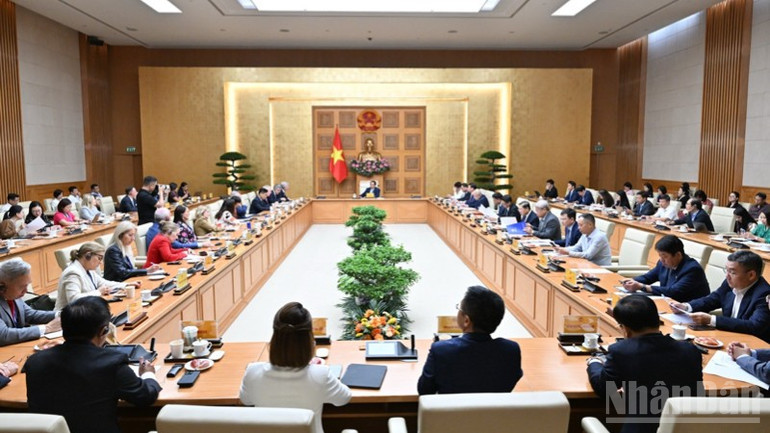
Overview of the meeting with U.S. and Vietnamese officials. (Photo: Tran Hai/Nhan Dan)
Also in attendance were Minister of Industry and Trade Nguyen Hong Dien, leaders of various ministries and agencies, and USABC executives including Gregory Walters, Chair of the Finance and Risk Management Committee; Brian MacFeeters, former Ambassador and USABC President and CEO; and Ted Osius, former Ambassador and current Senior Vice President and Regional CEO. The delegation featured major American and global companies such as Abbott, Amazon, Apple, Boeing, Brunswick, Citibank, Exxon Mobil, Ford, Google, IBM, Intel, Manulife, Meta, UPS, Warburg Pincus, Odgers Berndtson, and Zuellig Pharma.
Representatives from USABC expressed appreciation for the Prime Minister’s ongoing engagement with U.S. businesses, noting that this was the second USABC delegation received since the end of 2024.
They commended the results achieved after previous meetings and the government’s active efforts to resolve challenges raised by American enterprises.
The U.S. delegates praised Vietnam’s improving business environment and streamlined governance reforms. They reiterated long-term commitment to investment and collaboration in Vietnam, and shared proposals to further enhance bilateral trade and business relations.
Ted Osius affirmed that American companies fully trust Vietnam’s market economy and have no concerns over its regulatory status.
Prime Minister Pham Minh Chinh thanked the businesses for their trust and reaffirmed the government’s commitment to enabling foreign enterprises to thrive.
He urged ministries to promptly consider and respond to the delegation’s proposals, based on the principle of “six clarities”: clear responsibility, person, task, timeline, authority, and outcome.
He called for increased cooperation with U.S. companies, especially in frontier sectors such as science and technology, innovation, digital transformation, and artificial intelligence.
Highlighting ongoing reforms, the Prime Minister stated that Vietnam will continue to shift from passive management to proactive service, focusing on citizens and businesses as the center of governance.
Regarding specific concerns, he assured equal access to resources for domestic and foreign enterprises, and further improvements in visa, labor, and food safety regulations.
Vietnam and the U.S. have made significant progress in negotiating tax frameworks, with both sides having reached a draft joint statement on a fair and balanced trade agreement framework. This is expected to create a stable, sustainable foundation for bilateral economic cooperation.
The Prime Minister expressed appreciation for U.S. support during the negotiations and emphasized that American investment has positively contributed to fostering the bilateral partnership and mutual prosperity.
He called on U.S. businesses to voice strong support to their government for tariff cooperation on specific goods, and to avoid trade remedies or actions that might affect the current strong relationship.
He also urged U.S. officials to formally recognize Vietnam’s market economy status and remove export restrictions on high-tech items.
He encouraged further high-quality U.S. investment in Vietnam, including technology transfer, management training, and workforce development - particularly in agriculture, processing industries, semiconductors, and AI.
He also asked U.S. companies to facilitate the integration of Vietnamese firms into global supply chains and provide input for policy development.
To support U.S. investment and deepen the Comprehensive Strategic Partnership, Prime Minister Pham Minh Chinh reaffirmed Vietnam’s commitment to “three togethers”: listening and understanding among government, businesses, and citizens; sharing a common vision for sustainable cooperation; and winning and growing together - with shared happiness and pride.
He added that Vietnam will continue cutting administrative procedures and regularly review legal frameworks to ensure an open, equal, and business-friendly environment that protects legitimate investor rights.
These efforts aim to reduce compliance, input, and logistics costs while enhancing competitiveness and ensuring long-term, stable, and effective operations for investors.
PV